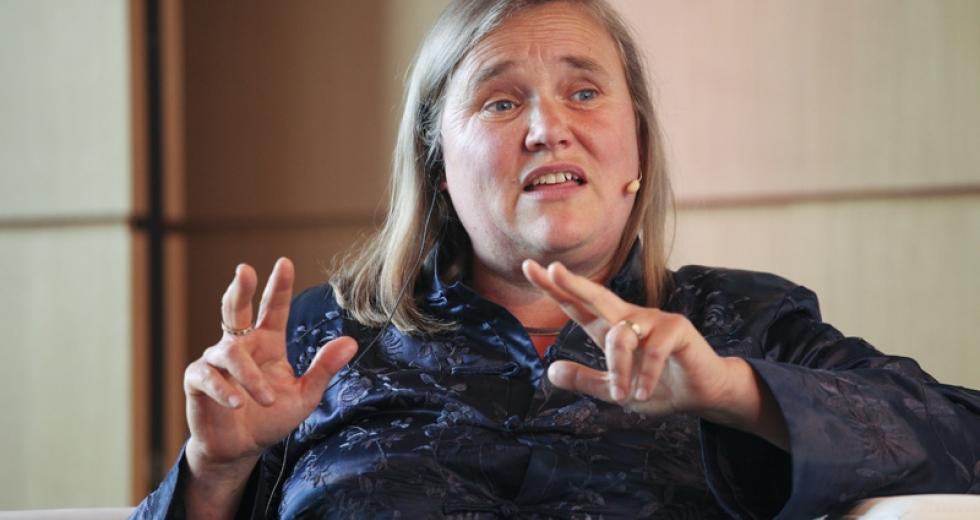
Does the following extract from Maryette Ables excellent article suggest the possible areas in which 'Graduates' of International Leadership organisation Common Purpose might be found?
Every community has one or more such NGO's (Non-Government Organisations)....They are placed in a community to build public support for some component of the International agenda ... NGO's provide the interface between globalists and the rest of society. Every CSO-NGO is empowered by a funding source that pays for a specific function designed to advance a broader agenda. The funding source, whether public or private, works to advance an agenda that is co-oordinated by, and developed through, the NGO Triumvirate working with UN agencies and National Governments.
Logic dictates that each of these NGO's needs leaders. Many of these organisations have statements of common purpose or claim to be working towards a common purpose. Is it purely coincidental that an International Leadership training organisation is also named Common Purpose? I don't think so. In order to illustrate how the work of this organisation apparently slots into the new system of global governance we will examine official common purpose public announcements and also uncover the activities of their 'leadership trainees' following their graduation.
Common Purpose tells us itself that:
In every democracy, there is an invisible open space. It lies between the citizen and the state. Between the immediate responsibilities facing each individual and the institutional responsibilities of the Government. It is political, but not party political: a place where people come together and act for a greater good. And it is open to every sector of society. Our aim is to fill this space with as many people as possible-and give them the knowledge, inspiration and connections they need to be effective. To encourage all kinds of people into it-and to see all kinds of initiatives come out of it. To discover new leaders in the bustling crowd-and to show the lone voices that they are not alone. Common Purpose Charter
In response to public criticism Common Purpose recently released the following statement:
Over the past few years Common Purpose and its' founder and CEO Julia Middleton, have been the subject of conspiracy theories and negative commentary regarding their integrity. They have been accused of everything from running Britain and Europe-and more recently the US-to being a secret brainwashing society. They have also been portrayed as criminals, child abusers, embezzlers of Government funds and being spies.
We have refrained from taking legal action to date because Common Purpose staff, course participants, customers and supporters have tolerated these assertions in the spirit of freedom of speech and it not being in the best use of charity funds ... Our lawyers have written to the authors of these remarks to make it clear that we will no longer allow such allegations to go unchallenged. Statement from Sir David Bell, Chair of the Trustees of Common Purpose, addresses the conspiracy theories about Common Purpose.
I ask:- Could Common Purpose, and its graduates, not be acting as 'stealth agent's of the United Nations whose primary role is to indoctrinate leaders in UN Agenda 21 policies?
In order to explore this possibility I will initially present research findings that demonstrate the use of a commonality of language use by both Common Purpose and the United Nations.
Diversity
The United Nations tells us that:
Organisations can be strengthened by leveraging difference that mirror the diversity of its' citizens ... Managing a diverse workforce can be a challenge. When people from different backgrounds come together in the workplace, there is potential for great accomplishment, but also for greater conflict.
The Common Purpose About Time website tells readers that
[t]he campaign will increase the number of people involved in public life across the UK ... the breadth that diversity provides is critical to a board’s ability to spot issues and trends.
In addition, Common Purpose have produced a report entitled Diversity of Representation in Public Appointments.
National Legislation should create a climate that strengthens the role of NGO's as Social Partners.
The United Nations system and Governments should initiate a process, in consultation with non-governmental organisations, to review formal procedures and mechanisms for the involvement of these organisations at all levels from policy making and decision making to implementation. The United Nations, Agenda 21 & the Millennium Development Goals - Strengthening the role of Non-Governmental Organisations: Partners for Sustainable Development.
What has happened in practice?
Evidence from Wales
Beyond boundaries: Citizen Centred Local Services for Wales was a review of local service delivery in Wales. The review team was Chaired by Sir Jeremy Beecham. The following statements are extracted from that report:
Para 6.30 - Leaders need to create a culture which emphasises achieving results across organisational boundaries.
Para 6.56 - The search for citizen centred solutions must include genuine and open partnership with the private and third sectors.
Para 6.58 - The third critical success factor is partnership. Partnership is difficult and needs the investment of time, resources and leadership, but it has a key role to play in delivering significant improvement in services. To achieve this, the whole architecture of public services, and the culture, skills and behaviours of those who work in them, must be made more conducive to shared delivery.
Para 6.59 - For a partnership to make a real difference, politicians are going to have to be willing to go much further in pooling sovereignty with other organisations.
Para 6.62 - The aim must be to make local and regional partnership working more routine. By creating systems which fit together and are not sealed into silos.
Is is coincidental that Sir Jeremy Beecham has been a Council Member at charity Common Purpose since 1989?
It is difficult not to conclude that the Beecham review followed the blueprint outlined by the United Nations in changing the role of non-government organisations (Third Sector) in relation to "policy-making, decision making and implementation". The Welsh Assembly Government responded to the review with a document titled Delivering Beyond Boundaries: Transforming Public Services in Wales which sets out the Assembly Government's programme for taking forward the transformation of public services in Wales.
In the following short film, Early days: Sir Jeremy Beecham on leadership and the purpose of Common Purpose, Sir Jeremy speaks of the importance of seeking future leaders and ensuring a diverse representation of views in leadership. [my emphasis]
Evidence from England
Mutual Action, Common Purpose: Empowering the Third Sector. published by the Fabian Society, also describes many of the structural changes outlined in the Beecham report. It should come as no surprise to readers if I point out that many of the individuals named in the acknowledgement section of this report have connections with the organisation, Common Purpose.
Beyond Authority
In the following short video, Julia Middleton, CEO of Common Purpose, talks about her book Beyond Authority: Leadership in a changing world. Middleton argues that:
new leaders need to be confident to legitimise themselves and to challenge old ways. They need to develop a leadership style that enables them to lead beyond the traditional boundaries and constraints of their organisations.
If, according to the United Nations, public, private and third sector organisations are to work in Local, National and International Partnerships then International, National and Local leaders, who are well schooled in a shared Agenda (Agenda 21) and are connected by a dedicated network definitely become an essential ingredient. Wouldn't the secret placement of leaders. who are also Common Purpose graduates, into powerful positions within such organisations appear to satisfy this requirement perfectly?

